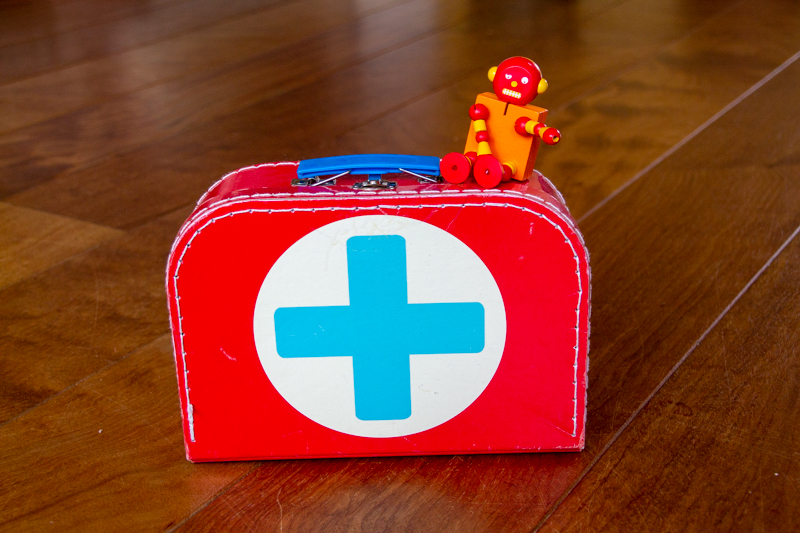Cyberchondria


My daughters love to play ludo, but I have learned to dread it. In Dutch, the game has the telling name: ‘Mens erger je niet’, loosely translated: ‘Man, don’t get upset’. It is certainly appropriate, because it almost always ends in a furious tantrum, sometimes with board and pieces flying across the room. One of my daughters’ key sources of complaint is the need to throw a six to put one of your pieces on the board. Sometimes, one child will hit a run of bad luck, and go through turn after turn without throwing a six. This inevitably leads to accusations of cheating – it can’t possibly be fair that it takes so long to throw a six! In vain do I attempt to explain the rules of probability, that you have a 1 in 6 chance of throwing a six, and that it is perfectly possible to throw several times in a row without getting a six. In fact, you have a 1 in 10 chance of throwing 12 times in a row and not getting a six. But that cuts no ice with my daughters – it just doesn’t feel fair.
However, I can’t really blame them for their failure to grasp the laws of probability. I made exactly the same mistake myself when we were trying for our second child. Coincidentally, the chance of conceiving per month is 15-25%, so the lower limit is about the same as the chance of throwing a six – 16%. So, when three, four, five months went by without me getting pregnant, there was nothing whatsoever in the statistics that should give cause for concern. I was rolling my dice, but not yet getting a six. I simply had to wait a little longer to get my piece on the board, didn’t I?
But, given how quickly I had got pregnant the first two times, I couldn’t help but be a little impatient. This was when I made my big mistake – and this was when cyberchondria raised its ugly head. Cyberchondria is defined by Wikipedia as being “the unfounded escalation of concerns about common symptomology based on review of search results and literature online”. But I far prefer the definition given by the Australian sitcom ‘Lowdown’– something along the lines of “googling your symptoms to always come up with the same answer – cancer”. Of course, once I started googling for possible problems conceiving, what did I find? That’s right – long lists of possible problems conceiving. My comfort so far had been that we already had one child, so there couldn’t be anything wrong with our fertility, could there? Wrong! After just a brief bit of googling, I had a wonderful new term to keep me awake at night – ‘secondary infertility’.
Secondary infertility is the inability to become pregnant after previously having given birth. As soon as I read that, I got nervous. No matter how I tried to reason with myself and list all the rational – and probabilistic – arguments why it was perfectly normal that I wouldn’t be pregnant yet, still a little voice in my ear kept whispering ‘secondary infertility’. My age, which hadn’t bothered me one bit when we had our first daughter, suddenly seemed a major issue. I had missed my chance! My daughter would remain an only child.
When, after not so many months more, I became pregnant, the relief was tremendous. Although I didn’t have the time to focus on my pregnancy that I had had with our first child, still it was a very special time. It was made doubly precious by the knowledge that it would be my last, and by a heightened awareness of my good fortune, after all my (needless) worries.
I wouldn’t want to suggest that using the internet for help with parenting is a bad idea per se. We’ve found all sorts of useful information online, from how to know when it was time to buy our daughter a new car seat, to instructions on how to administer warm oil to help an earache. With family far away and doctors surgeries shut at night, the internet has often been our saviour in times of need, especially once we found a few good, reliable sites. But I have learned that there are things I should not try to do with the internet. The first is that, while the internet can offer descriptions of illnesses, their symptoms and treatments, it can’t diagnose – it can’t tell me if I – or my child – has that illness or not. The second is that the internet is not an oracle. When I miscarried my first child, during the early stages when there were warning signs, I spent hours surfing the internet, reading about other people’s experiences. When I read that it had all turned out well for one woman, I breathed slightly easier, when I read that another woman had miscarried, my guts twisted. It was all totally pointless, as nothing I could possibly read would answer the question I really had – would I miscarry? I might just as well have sat reading the tea-leaves.
So, now I try to limit my use of the internet to collecting information. If I want a diagnosis, I go to a human expert. If I want to know the future, I just have to wait. The dice will fall where they may. Unless, of course, one of my daughters really has loaded them…?